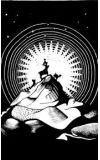
12 Jun 2013 02:42:26
Leach begins with lilies and dickers marvellously onward through the cosmos, ranging from little to large, spinning exotic stories about the multiple feathered and freckled inhabitants of the Earth. Her roving eye might settle on portly, industrious beavers, "warm and dry in their oily parkas" and once categorised erroneously by a pope as fish, or else on Mars's moon Phobos, meaning "panic", which apparently resembles "a potato that has experienced one terrible, and many average, concussions".
She certainly knows her onions, and her butterfish besides. There's a palpable bedrock of scientific knowledge here, from the appetites of pandas to the complex navigatory impulses of the blackpoll warbler, "a four-inch long sprite knit of feathers, hollow bones and heart". I can't say it had ever occurred to me before that lizards are as experimental in their forms as pasta, but after being formally introduced to the thorny devil, the whiptail and the Jaragua sphaero I am persuaded that it's true.
The details about penguin procreation might be familiar from Attenborough, but no amount of viewings of Planet Earth will prepare you for Leach's vision or her style, her tumultuous, incantatory rejoicing in the astonishing multiplicity of the Earth: "This gardeny world of moonflowers and lespedezas and daphnes and daisies and frangipanis and ghost weed and bluets and galaxes and blazing stars and blood-on-the-snow and mind-your-own-business and porcelain berries and rain lilies and chinquapins and withywinds and salsifies and fritallaria."
This kind of inspired taxonomy requires two skills: sharp eyes and an appetite for language, and Leach possesses both in spades. Her diction ranges through the archaic, the specialised and the obscure to neologisms, picked up on the hoof and as readily discarded (nouns pressed into service as adjectives seem a particular favourite). Moldeywarp. Toxodon. Statocyst. Heart-soup. This is language employed as a direct appeal to the imagination, a way of reconnecting our hearts to what she calls the round and ringing Earth.
In a short, barbed essay entitled "Memorandum to the Animals", Leach deals directly with the importance of imagination, noting that many animals will fall into extinction twice over, failing to survive even in the half-light of our memories. "To properly live on in the imagination," she writes, "you should have someone who really knows you, who knows the pitch of your buzz, the rufous hue of your throat, your fondness for comfrey." I suspect this is a sidelong way of introducing her own role: as ambassador between worlds, the one imperilled and the other mindlessly, blindly imperilling.
Elsewhere, she describes her frustration with conventional notions of God, positing instead the beguiling, playful notion that the word of God is literally embodied in living forms, that the word of God goes scrambling through brambles and duck-diving in ponds. "His words are not repetitive," she writes. "The only thing his words have in common with each other is that they are strange and they are themselves." This is mysticism of a peculiarly American sort, the same pantheistic ecstasy of Whitman and Thoreau.
In the last essay here, an afterword called "The Round-Earth Affair", she deals directly with urbanisation and humanity's creeping estrangement from nature. It's hard to tell if it's a parable or an anecdote drawn from life; either way, it strikes a chord. In it, she describes the experience of dwelling in a city, "hard to horrify, living already as if nature were gone".
After a long time of inhabiting this miserable, jostling place, a building opposite her apartment is knocked down and in its place a park is started. Butterflies appear, followed by birds, beetles and luscious red flowers. Almost immediately, the humans start changing. Confronted with the anarchic wonders of the world, they become protective, besotted, bewitched. As Leach says, when we experience nature directly, "we are fastened with desire: we cannot relinquish butterflies and return to uninterrupted road".
It's a slight hope, that our planet might be preserved. Here's a plan, though. Buy this book for everyone you know. At best, we'll all be seduced into doting biophilia. At worst, we'll have a record of mice and rhinos and fainting goats, our planet's "beautiful flocculence, its beautiful freight", to wonder over in whatever ungreened hell we're careering towards.

